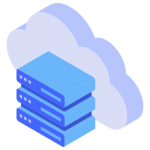What is Cloud?
"The cloud" refers to servers that are accessed over the Internet, and the software and databases that run on those servers. Cloud servers are located in data centers all over the world. By using cloud computing, users and companies don't have to manage physical servers themselves or run software applications on their own machines. Cloud computing is the on-demand availability of computer system resources, especially data storage (cloud storage) and computing power, without direct active management by the user. The term is generally used to describe data centers available to many users over the Internet. Large clouds, predominant today, often have functions distributed over multiple locations from central servers. If the connection to the user is relatively close, it may be designated an edge server.
GPU Cloud
A GPU (Graphics Processor Unit) is a familiar term – it’s the component that enables video and sophisticated graphics, such as video games, to run on the PC. GPU Cloud Computing is a fast, stable, and elastic computing service based on GPU ideal for various scenarios such as deep learning training/inference, graphics processing, and scientific computing. GPU Cloud Computing can be managed just like a standard Cloud Virtual Machine instance with speed and ease. GPU is used together with a CPU to accelerate deep learning, analytics, and engineering applications for platforms ranging from artificial intelligence to cars, drones, robots, search engines, interactive speech, video recommendations and much more.
GPU Cloud suitable for a wide range of uses
Computational Finance
Analyze and calculate large and complex financial data, perform tons of transactions in real-time. Do accurate financial forecasting, faster.
Scientific Research
Design and implement data-parallel algorithms that scale to hundreds of tightly coupled processing units: molecular modelling, fluid dynamics and others
AI/ML/DL
Train complex models at high speed to improve predictions and decisions of your algorithms. Use any framework or library: TensorFlow, PyTorch, Caffe, MXNet, Auto-Keras, and many more.
Big Data
Deal with large-size data sets and continuously growing data, splitting it up between processors to crunch through voluminous data sets at a quicker rate.
Computer Vision
Accelerate Convolutional Neural Networks based deep-learning workloads like video analysis, facial recognition, medical imaging, and others
Contact Form
For More Details or Queries, You can submit the form below

